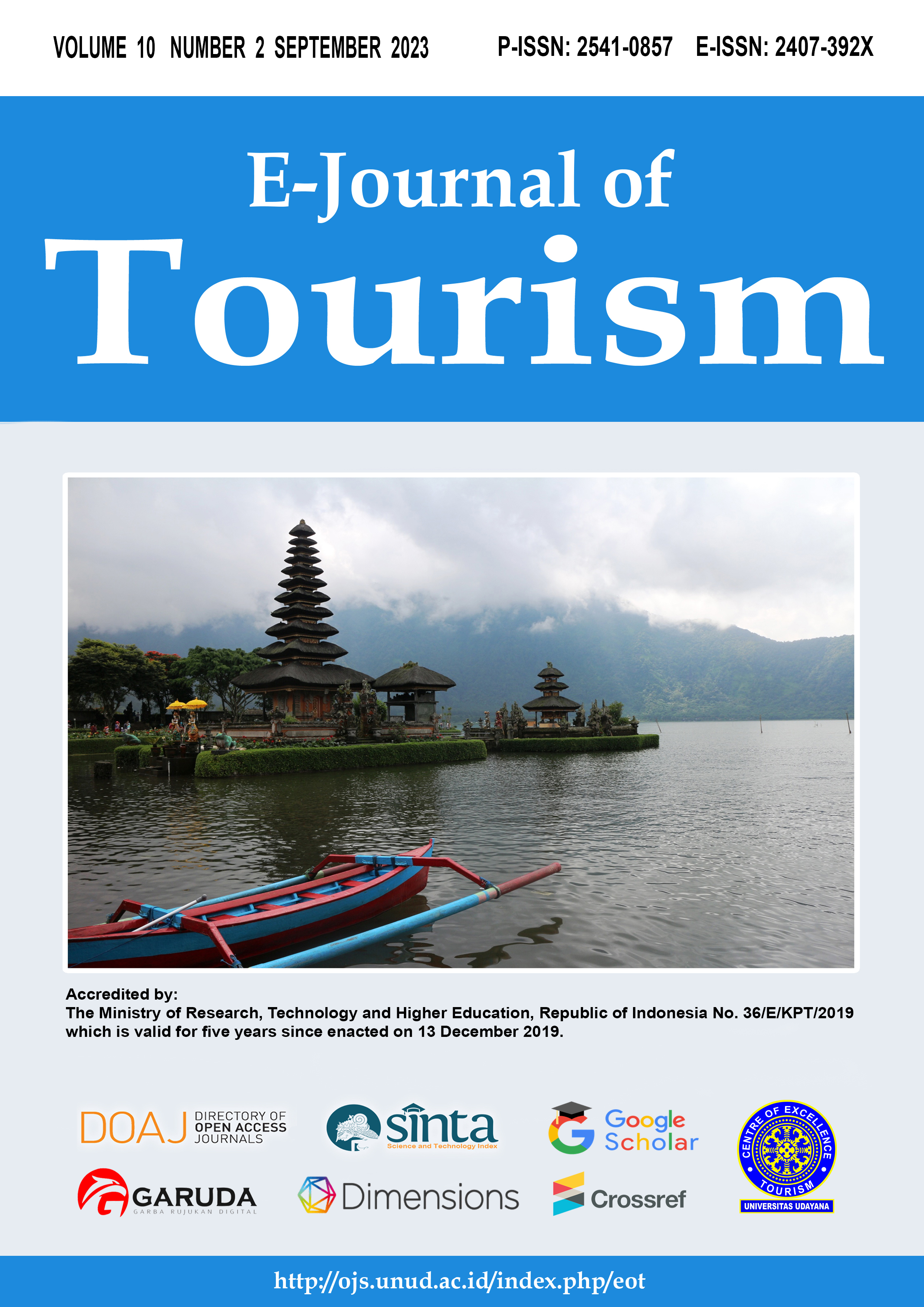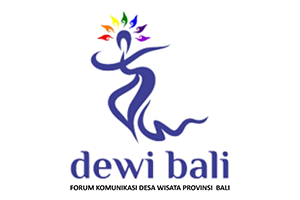Awakening Uniqueness: Branding Strategy of Undisan Rural Tourism in Bangli Regency Through Eco-Experience
Abstract
This research article explores the branding strategy of Undisan Rural Tourism in Bangli Regency, with a focus on its success in winning the 3rd Places of Tourism Village Award through an eco-experience. The study utilizes a SWOT (Strengths, Weaknesses, Opportunities, and Threats) analysis to identify and evaluate key factors that contribute to the village's branding strategy. Undisan Rural Tourism embodies a unique blend of natural beauty, cultural heritage, and sustainable practices, making it an exemplary case study for rural tourism development. The research methodology involves qualitative approaches. Primary data is collected through interviews, surveys, and participant observations, while secondary data is gathered from relevant literature, reports, and online sources. The SWOT analysis framework is applied to assess the internal and external factors that influence the branding strategy of Undisan Rural Tourism. The findings of the study reveal several strengths that have contributed to the success of Undisan Rural Tourism. These include its pristine environment, rich cultural heritage, authentic local experiences, and strong community engagement. Additionally, the village has capitalized on opportunities such as increasing demand for sustainable and eco-friendly tourism experiences. However, the research also identifies certain weaknesses and threats that need to be addressed, including limited infrastructure, inadequate marketing efforts, and competition from neighboring tourism destinations. Based on the SWOT analysis, this article proposes strategic recommendations to further enhance the branding strategy of Undisan Rural Tourism. These include improving infrastructure and facilities, expanding marketing efforts through digital platforms, fostering partnerships with local stakeholders, and implementing sustainable practices to preserve the environment. The study concludes that Undisan Rural Tourism's success in winning the 3rd Places of Tourism Village Award can be attributed to its unique branding strategy, which highlights the village's distinctive characteristics and eco-experiences. By addressing the identified weaknesses and capitalizing on existing strengths and opportunities, Undisan Rural Tourism can continue to thrive as a leading destination for sustainable rural tourism, setting an example for other tourism villages in the region
Downloads
References
Christou, L. (2012). Is it possible to combine mass tourism with alternative forms of tourism: The case of Spain, Greece, Slovenia and Croatia. Journal of Business Administration Online, Spring 2012.
David, Fred R. dan David, Forest R. (2017). Strategic Management concepts and cases A Competitive Advantage Approach. Sixtennth Edition. England. Pearson Education Limited.
Dinnie, K. (2008). Nation Branding. Concepts, Issues, Practice. Oxford: Butterworth-Heinemann.
Gautama, B. P., Yuliawati, A. K., Nurhayati, N. S.,Fitriyani, E., & Pratiwi, I. I. (2020). Pengembangan desa wisata melalui pendekatan pemberdayaan masyarakat. Bernas: Jurnal Pengabdian Kepada Masyarakat, 1(4), 355–369.
George, W., Mair, H. & Reid, D. (2009). Rural Tourism Development, Localism and Cultural Change. Ontario: Channel View Publications.
Huda, Nisrina Nafi’atul., Ma’ruf, Farid., Jamiko, Hapsoro Agung. Developing Rural Tourism: A Potential Contribution to Achieve Sustainable Development Goals. Jurnal Ilmiah Teknik Industri. doi: 10.23917/jiti.v21i2.18071
Jamrozy, U. (2007). Marketing of tourism: A paradigm shift toward sustainability. International Journal of Culture, Tourism and Hospitality Research, 1(2), 117–130.
Kavoura, Androniki. Bitsani, Evgenia. (2013). E-branding of rural tourism in Carinthia, Austria. Tourism: An International Interdiscipinary Journal, Vol. 61 No. 3, 2013. UDC: 338.48-44(1-22) (436)
Kavaratzis, M. (2005). Place branding: a review of trends and conceptual models. Marketing Review, Vol. 5 No. 4, p. 329-42
Keller, Kevin Lane. (2003). Strategic Brand Management: Building, Measuring, and Managing Brand Equity. New Jersey: Prentice Hall.
Kotler, Philip, 2002, Marketing Management, The Millenium Edition
Kotler, P. and Keller, K.L. (2009). Marketing Management. Pearson Prentice Hall
Kotler, P. and Keller, K.L. (2009). Marketing Management. Pearson Prentice Hall.
Meenaghan. 1995. “The Role of Advertising in Brand Image Development”. Journal of Product and Brand Management, Vol. 4 No. 4.
Molina, A. & Esteban, Á. (2006). Tourism Brochures, Usefulness and Image. Annals of Tourism Research, 33(4), 1036-1056.
Nieto Masot, A., & Rios Rodriguez, N. (2020). Rural tourism as a development strategy in low-density areas: Case study in Northern Extremadura (Spain). Sustainability, 13(1), 239
Ritchie, J. R. B., & Ritchie, R. J. . (1998). The Branding of Tourism Destinations. Annual Congress of the International Association of Scientific Experts in Tourism, 98 (September), 1–31.
Singh, Vir. 2015. Eco-Tourism as a Sutainable Alternative to Conventional Tourism. (2015). Journal of Tourism & Hospitality, 04(04). https://doi.org/10.4172/2167-0269.1000168
Sudarmiatin, S., Kirom, NR., & Adi Putra, IWJ (2016). Faktor-Faktor Penentu Daya Tarik Wisata Budaya Dan Pengaruhnya Terhadap Kepuasan Wisatawan. Jurnal Pendidikan - Teori, Penelitian, Dan Pengembangan, 1(3), 536–546. https://doi.org/10.17977/jp.v1i3.618.
Yang, J., Yang, R., Chen, M.-H., Su, C.-H. J., Zhi, Y., & Xi, J. (2021). Effects of rural revitalization on rural tourism. Journal of Hospitality and Tourism Management, 47, 35–45.
Zhang, Xue Ming. (2011). Research on the Development Strategies of Rural Tourism in Suzhou Based on SWOT Analysis. 2012 International Conference on Future Energy, Environment, and Materials. Published by Elsevier B.V. Selection and/or peer-review under responsibility of International Materials Science Society. doi:10.1016/j.egypro.2012.01.207

This work is licensed under a Creative Commons Attribution 4.0 International License.
The copyright of the received article shall be assigned to the journal as the publisher of the journal. The intended copyright includes the right to publish the article in various forms (including reprints). The journal maintains the publishing rights to the published articles.




















